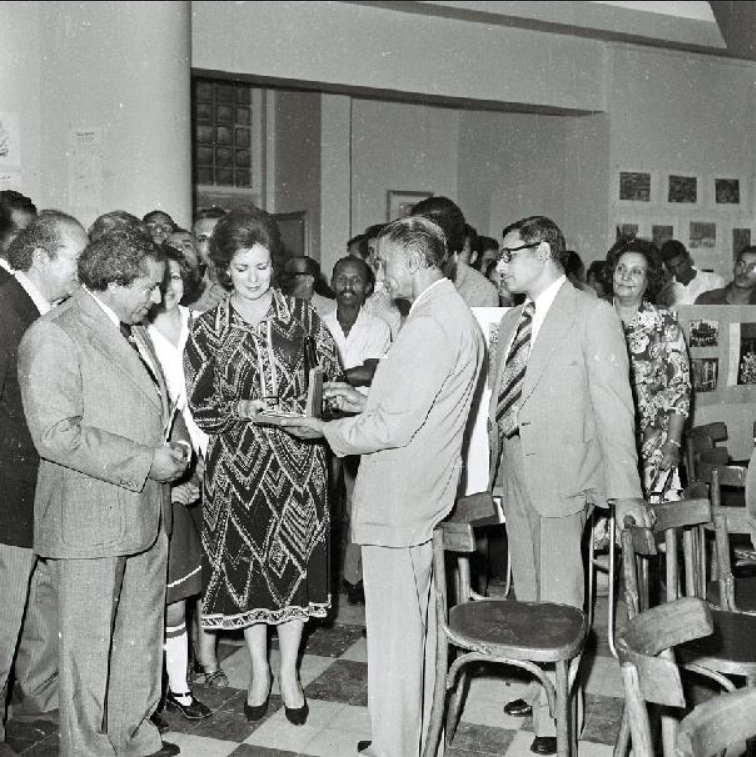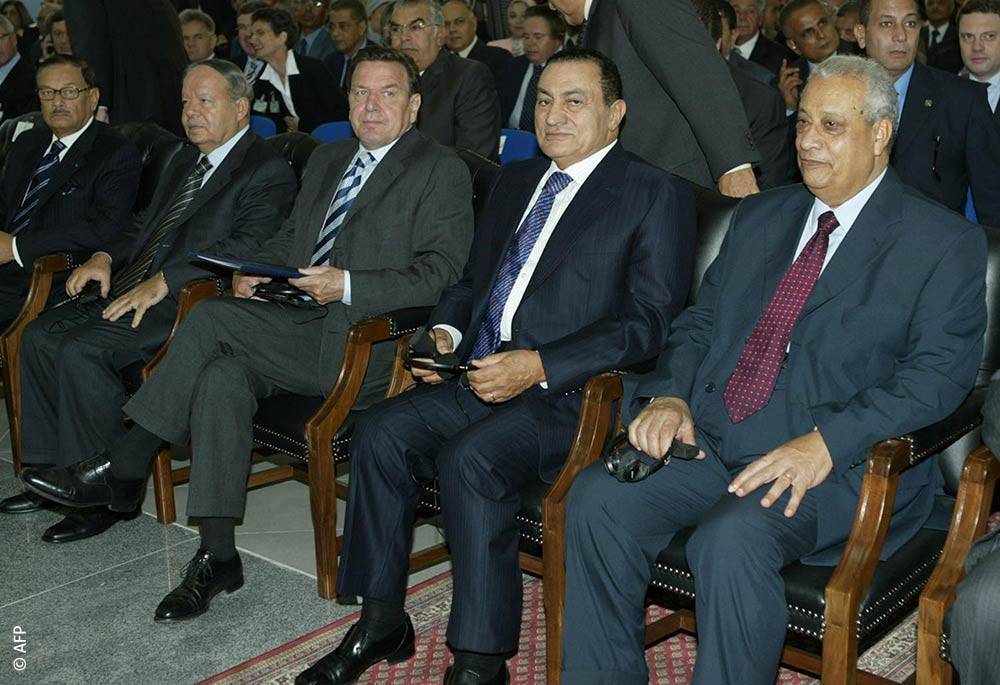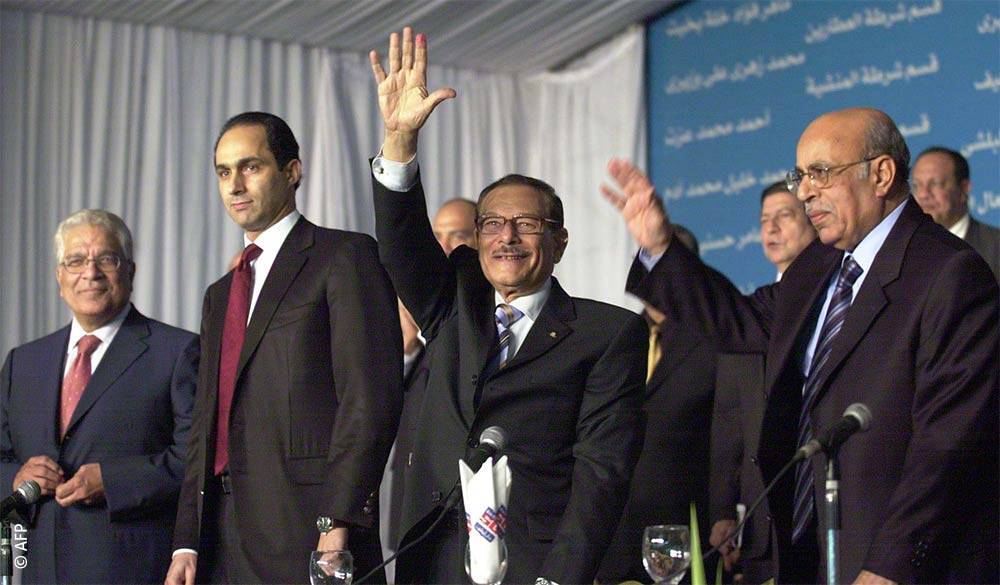As soon as news broke out of the death of Safwat El-Sherif, the legendary Minister of Information during Mubarak’s reign, old accusations against the controversial figure began to resurface. The rumors range anywhere from claims of his involvement in the assassinations of Soad Hosny and Omar Khorshid to unmistakable derision from those who described him as “the greatest pimp” – in reference to El-Sherif’s experience with Egyptian intelligence under Salah Nasr in the sixties.
Whether these accusations hold any actual truth to them or not, confining Safwat El-Sherif within these tales and claims is a gross injustice to the legacy of a man that helped shape public opinion for decades, in addition to being the lead cause for the decline in Egypt’s once-booming media industry.
Safwat El-Sherif is a complex character, and his story is one that reveals the intricacies of how people and things in Egypt are done. It is a story that deserves to be told, with roles that must be defined.

Safwat El-Sherif is a complex character, and his story is one that reveals the intricacies of how people and things in Egypt are done. It is a story that deserves to be told, with roles that must be defined.
The State Information Service: A Return From The Shadows
In October 1977, Mursi Saad El-Deen, brother of famed composer Baligh Hamdi, was appointed chairman of the State Information Service’s (SIS) board of directors. The appointment heralded Safwat El-Sherif’s return to the public limelight after spending nearly a decade in the shadows in light of his expulsion from the General Intelligence Service (GIS) for his involvement in the case that came to be known as “Deviations of intelligence and the overthrow of the regime.”
Speaking to ‘al-Masry al-Yawm’ (February 2009), Saad El-Deen shares the details of his introduction to Safwat El-Sherif. He says, “I first met El-Sherif when I was with my wife’s cousin Hasan Oleish – who was only the second top man of Egyptian Intelligence during Salah Nasr’s reign.”
Following the meeting, Saad El-Deen worked on bringing El-Sherif aboard the SIS’s directorial committee. Ironically, however, and only a year after his appointment, El-Sherif outgrew Saad El-Deen and managed to replace him. It was rumored that Saad El-Deen’s downfall came at the hands of El-Sherif, who might have recorded the former saying he would not join the president’s National Democratic Party, and that he would prefer to join the Wafd Party instead. Nevertheless, El-Sherif’s ascension to the position of chairman of the board of directors in October 1978 marked the beginning of his long journey in politics and public service.
El-Sherif succeeded in reviving the SIS from its clinical death. Gone were the days of the agency being a “garage” for pleasing and appeasing. Luck served him well with his appointment to the position only a month after Anwar Sadat signed the Camp David peace agreement with Israel. El-Sherif knew the president to be very careful about his image in foreign press, and the SIS aptly rose to the challenge under El-Sherif’s direction. He played the part well, holding it for 4 years, only leaving the agency to become Minister of Information in 1982.

“Safwat El-Sherif understood that clashing with foreign reporters in Egypt would do the administration no good, and that it would likely cause him a constant headache and unnecessary loss,” explains Hicham Kassem to Raseef22. Speaking about El-Sherif’s relationship to foreign media, Kassem says, “The man had enough foresight and wisdom to give Volkhard Windfuhr, the chairman of the ‘Foreign Press Association (FPA)’ in Egypt, free reign to operate. With the SIS at his disposal, El-Sherif set the tone for the Egyptian state’s relationship with foreign media and kept things running smoothly between the two. The relationship remained peaceful and free of major clashes or crises, unlike today where officials constantly create avoidable problems for themselves and the regime.”
Kassem concludes, “Of course Sadat and Mubarak’s policies were completely different than Sisi’s, but that doesn’t negate the fact that El-Sherif handled the issue of Egypt’s relationship with foreign media wisely and smoothly… whether as head of the SIS or later on as minister of information.”
The Creator Of Positions
More Powerful Than The Position
Mursi Saad El-Deen was neither the first nor the last to be pushed aside during El-Sherif’s climb to the top. The list goes on and on. Yet interestingly – and, perhaps, impressively – El-Sherif was the one to give the positions he assumed authority and not the other way around.
For instance, before he took on the position of head of the State Information Service (SIS), the institution was virtually forgotten and considered nothing more than a “garage.” Knowing the times and understanding the need for better communication with the West, El-Sherif revived the SIS and brought it to the center of state interest. He implemented a careful plan to polish the image of ‘the peacemaker’ (Sadat) and the first lady, American style, successfully bringing the SIS to the personal attention of the president and his wife.
The same thing happened with the Ministry of Information, which was established in 1952 under the title of the Ministry of National Guidance. Salah Salem, a member of the Free Officers, was appointed minister between the years of 1953 and 1958 – giving Nasser the time needed to establish his rule. Over the next years, the ministry took a backseat. Ministers would last a year or two at best, and, apart from M. Abdel-Kader Hatem, none left a noteworthy performance or track record.
That all lasted until Safwat El-Sherif, who turned the position to one of undeniable weight within the state. He made the minister of information a decisionmaker, rather than mere reporter or messenger, and performed the role with such grace and reverence that none of his successors had managed to pull off. In stark comparison, the latest minister of information, Osama Heikal, was slammed just earlier this week for moral and financial misconduct in parliament.

Likewise, when he was toppled from his position as Minister of Information by the rising bloc of Jamal Mubarak in 2004 and banished to lead the senate, the position was no more than an honorary one reserved for old and retired veterans of politics like Ali Lutfi and Mustafa Kamal Hilmi. Within months, however, El-Sherif rejuvenated the council’s overlooked authorities like licensing newspapers and political parties. The senate, along with its leader, became integral parts of Egypt’s press and politics.
To be fair, El-Sherif’s constant activity and restless energy resembled that of a tireless machine. In addition to his unique ability to conquer and overthrow foes, he knew how to pick his fights and possessed the wisdom to walk away from the ones he wouldn’t win. In short, Safwat El-Sherif was a mastermind.
Safwat El-Sherif’s constant activity resembled that of a tireless machine. In addition to his unique ability to conquer foes, he knew how to pick his fights and possessed the wisdom to walk away from the ones he wouldn’t win. In short, he was a mastermind
Prominent media figure Gameela Ismael provides a telling anecdote that shows how wisely and calmly El-Sherif chose his battles.
“Safwat El-Sherif had amazing grace and calm under pressure,” begins Gameela, speaking to Raseef22, she says, “In the year 1996, and during the awards ceremony of the Radio and Television Festival, the film ‘Souq Al-Huwat’ by Farida Omran (my mother) won first prize. We were surprised to hear the film’s name called out with zero reference to its director!
With the impulsiveness the comes with youth, I stormed the stage and said to the minister: ‘How could this happen to my mother? Will you allow it? Why are you standing aside as she gets ignored like so?’
Everyone on stage tensed up, especially since the ceremony was being broadcast live… Everyone but Safwat El-Sherif, that is, who didn’t seem to bat an eye. He smiled and handed me an award, saying, ‘Take this recognition award and go down that staircase over there.’ I tried to explain that I wasn’t one of the honorees and that the certificate he gave me was for Madame Samia Al-Atrabi, but he only replied firmly, ‘Take this reward and walk away, Gameela,’ not once losing his smile or cool.”
Gameela continues her tale, “I walked off stage, and everyone was panicking backstage. As soon as I was off-camera, I was surrounded by network security and held for the remainder of the ceremony. But as soon as Safwat El-Sherif walked off stage, he called for my mother. He apologized to her and spoke highly of her and her contributions. He then called on the crew of ‘Good Morning Egypt’ to schedule a segment with Madame Farida Omran immediately in pacification.”
Smiling, Gameela ends her story, “The following day, I was called in to the network’s head office for investigation. I was issued a warning, and the incident was added to my security record.”
How We Lost The Lead…
Throughout his 22 years in office as Minister of Information, Safwat El-Sherif never once stopped describing Egyptian media as a leading ‘pioneer’ of the field in the region.
Indeed, Egypt was – for decades – a pioneer in media. Perhaps due to the lack of competition in the past, or due to the previous generations’ skills, the fact remains Egypt lost its lead role under Safwat El-Sherif.
Egypt was – for decades – a pioneer in media. Perhaps due to the lack of competition in the past, or due to the previous generations’ skills, the fact is Egypt lost its lead role under Safwat El-Sherif, he obsessed with pleasing the president at any cost
One of the eyewitnesses to El-Sherif’s media era, in all its accomplishments and blunders, is Wigdan Mubashar, the former head of administration at the news section of Egypt’s Radio. Assessing the era, she tells us, “Safwat El-Sherif was a very smart man with good media vision. That needs to be said; the man knew and understood the value of media. Unfortunately, however, his personality traits – perhaps from his time in the intelligence agency – made him distrustful of others. He would insist on supervising every major and minor detail, and he was obsessed with pleasing the president at any cost. His good vision lacked the appropriate strategy, and the result is the media landscape we see today.”
Wijdan Mubashar provides an example, saying, “In the year 2000, Safwat El-Sherif realized that the world was heading towards specialization, and that it was now necessary for Egypt to have more specialized stations that cater to specific audiences and demands. Consequently, he decided to establish specialized and targeted channels (news – songs – educational – adult).”
The idea was excellent and indicative of his true understanding of both the period and its demands, “but the problem was that Safwat El-Sherif’s ultimate concern was to please the president by inviting him to a new opening every [year] or media celebration. And because he didn’t listen to or trust anyone’s opinion, he decided that the stations should be up-and-running before the president’s arrival, by any means possible.
The result was that Mubarak, indeed, came and opened the stations, but gave them no budget or equipment.
For a year and a half, we were literally spending our pocket money as employees to run the station. [Can you] imagine broadcast stations launched with no budget or preparations whatsoever?!”
Satellite TV… The Final Nail In The Coffin
The most deafening loss Cairo suffered – and the perfect example to what Wigdan Mubashar said about El-Sherif having vision but lacking strategy – was the field of satellite television. El-Sherif ushered Egypt into the age of satellite TV by launching ‘Al-Masriyah’ TV in 1990. It was mainly concerned with reaching out to Egyptian expats, and most of its airtime was occupied with cultural programs, mixed shows, and some drama serials.
But El-Sherif’s true challenge lied in the launch of ‘Al Nile News Channel’ in 1998, only two years after the launch of ‘Al Jazeera’ and one before the launch of ‘Abu Dhabi TV’.
“'Al Nile News’ had a good and promising start,” says Mohamed El-Setohy, the channel’s reporter in Washington. Speaking to Raseef22, he explains, “Despite its relatively few resources, it managed to win people’s attention with its fresh ideas and personnel. It ran a strong competition against ‘Abu Dhabi TV’, the leading Arab channel at the time. ‘Al Jazeera’, on the other hand, lagged behind till 2001, when it rose to fame with its coverage of the Afghanistan War.”
Commenting on this, news anchor at ‘Al Nile’ and witness to its beginning, Mona Al-Shayeb, says, “Safwat El-Sherif understood that in order to have a fighting chance in the field, he would have to create a network that prioritizes news or the event over the person. That was what made our newsroom’s editorial process different from any other in the field of Egyptian newscasts. We didn’t begin with news of the president, followed by that of the prime minister, and so on… On the contrary, we prioritized the ‘event’.”
Al-Shayeb adds, “We also had relatively more liberties than usual. We could never criticize Mubarak, of course, but we did invite to the air members of the opposition who aren’t allowed on terrestrial TV channels.”

On a similar note, Mohamed Al-Setohy continues, “Things were going well. But after the first glimmer of success, Safwat El-Sherif realized he had a winning card in his hand. So why wouldn’t he use it? He made the absurd decision to make ‘Al Nile’ broadcast on terrestrial TV as well, and that was the beginning of the end. ‘Al Nile’ turned into a propaganda and polishing mouthpiece, and the newsroom became too local, not only in terms of the news and its content, but how it handled it, too.”
Al-Setohy concludes, “Things went downhill following Safwat El-Sherif’s decision. Those who succeeded him implemented no change, and we hit rock bottom in 2009. I remember in that October, there was an Egyptian researcher in the National Institute of Health (one of the lead research centers in the US), working on a cure for Hepatitis B, which back then threatened the lives of 20 million Egyptian citizens. We went to the institute and interviewed the researcher and his supervisors. It made for a good news story: you have a large, eager audience; you’re providing meaningful information; and, at the same time, you’re showing the bright side of an Egyptian success story. Ironically, the report never made it to the air. Do you know why? Because ‘Al Nile News’ was preoccupied with one thing back then: The National Party’s Conference ‘For You’,” says Al-Setouhi with a bitter laugh.
Safwat El-Sherif left office after more than 22 years as Minister of Information. He left his position to turn a new page in the Egyptian Senate, where he played an intricate game of chess with political parties and the press… But that is a different story for another time.
Raseef22 is a not for profit entity. Our focus is on quality journalism. Every contribution to the NasRaseef membership goes directly towards journalism production. We stand independent, not accepting corporate sponsorships, sponsored content or political funding.
Support our mission to keep Raseef22 available to all readers by clicking here!
Interested in writing with us? Check our pitch process here!




